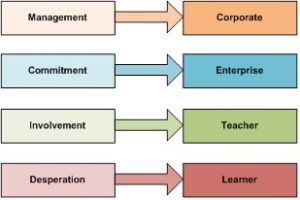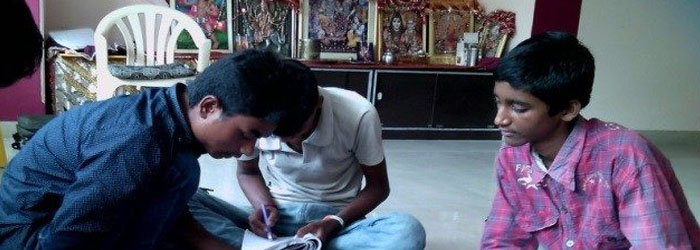This model of financial operation has been practiced for last four years by the Founder. It stipulates that this initiative does neither own assets nor funds. Promoters, be it an individual, social group or corporate, convinced with the genuineness of the initiative may like to support infrastructure, it’s up-keeping and operational costs either by way of direct payment to the vendor or reimburse the expenses. GYAN VIGYAN SARITA and its Learning Centers shall be only custodian and user of the facility so long as mutual trust between promoter and the user continues or the user finds himself to be in position to continue the use; in the event of breach of either Ownership of the promoter shall prevail upon and withdraw right of use of funds and assets. In such a situation GYAN VIGYAN SARITA shall ensure return of the belongings to the respective promoters, respectfully.
There is a well known phrase that Money Makes a Mere Go and in such a situation can one think of doing something of substance without money or resources. Resources can be bartered and money can be used to buy resources. The theory of economics defines resources required for production as land, labour, capital, and entrepreneurship. Further production in economics is considered to be a process of blending various material and immaterial inputs (plans, know-how, etc.) to make something for consumption (the output); it could be a product or service having value to individuals. It can be summarized as process of value addition. Apparently, the phrase has been coined very objectively and accordingly education has assumed a commercial significance where in a receiver has an expectation to have a value added at terminal point, and in lieu of it is prepared to invest resources, making the whole process highly commercial.
At this point it is essential to review education before it is branded as an economic activity. Almost every accomplished persons be it a saint, philosopher, artist, administrator, statesman or politician has defined either education or its purpose. In essence, education leads to building multidimensional trait in a person wherein while living for oneself an ability to respond to environment in a manner which is progressive and sustainable. There are many models of education one of them advocates freedom not only to learn and what to learn. A pre-requisite for exercise of freedom is awareness of the environmental dynamics, present state and evolution of change, in absence of this a son of a mason might not be able to think beyond masonry being कूप – मंडूक, and is obvious. That is why role of teacher is like a mentor who just does not imparts either information or knowledge but put in his best to create thrill of learning in his pupil; ascending into excellence is then just a matter of natural consequence. Education is about inculcating awareness of one’s own needs, strength, and opportunities ahead there by develop a vision and strives to accomplish it. This involves ability to analyze the cause of an outcome, evaluate alternatives options and thereupon take a considered decision and pursue it.
Plantation, agriculture is eco-friendly and considered to be a natural process. But, an insight would reveal it to be a regulation of natural process of regeneration. Even growth of a jungle is not free. It grows with strong survival instinct; denser is the jungle taller are the trees, sparse one has spread out trees. This together with the survival of the fittest has been responsible for demographic variance and its dynamics. This instinct, in case of human being, has a bit different manifestation where awareness of opportunities plays a big role, and in this process education acts as a vital catalyst.
The above discussions lead to an inference that unless imparting education is taken with the spirit of mentoring, it reduce to a commercial activity. Subject matter in education is a medium which provides an environment of integration of analytical approach into a thought process. And thought process is an essential spirit in ones personality. Unless this is achieved any education is just worth literacy and carries only an ornamental value. Scientific thought process builds an analytical approach with a proper blend of logic, cause and effect, and manifestation and becomes one’s inseparable strength. This elevates education much above commercial plane. Therefore, unless education is taken up passionately, both by pupil and teacher, to open up the thought process it would not be possible to realize its boon which extends much beyond subject matter into a plane where physical and meta-physical world coexists without boundaries between individual, environment and nature.
Need of education is time invariant; it has been there since predator age and has grown with the human quest to live on in progression. Education so long it is prerogative of elites it creates democratic imbalance and can be corrected with non-commercialization of education. There are countries with responsible citizens where education is democratized. There is no reason why each country should not aspire for such a system. Inertia of each socio-economic system depends upon the size of population, cultural and economic diversity and increase complexity in effecting a change in its educational philosophy.
In ancient Indian culture GURU-KUL tradition was at its epitome and it was non-remunerative, non-commercial and non-political. But, socio-economic changes has created its heavy leaning on commercial perspective, return on investment, and thus aberrations in education have crept in. Our experience at GYAN VIGYAN SARITA is that mentoring is the only engagement which requires negligible resource; it is a matter of Chalk and Talk driven by passion, dedication and commitment. Nevertheless, mentors and teachers have to exist in society it cannot become a reality unless society responds its responsibility towards them with deserving esteem. Society, in its failing, would be exercising blatant cruelty by blaming them for the drift towards commercialism. This is where role of elite section of society to act as facilitators and promoters comes into play. It is observed that there are many organizations, NGOs, vouching for philanthropy in education but operating in compartmentalized manner, and this appears to be the of their non-transparent to other players. Need of efforts on educational empowerment of unprivileged is so large that none, be it individual, a group or an organization can cater to it independently. Moreover, none of the philosophy driving such initiative is either complete or unbound; this requires a collective and collaborative operations where strengths of each other are respected in a manner to complement and supplement efforts of each other to ensure seamless continuity, consistency; educational patronage to the needy unprivileged children. Unless this is ensured, it would amount to building expectation out of education, among the target people, and then betraying them in times when they feel that they are inspired and prepared to derive benefit of it. At this juncture it is essential to emphasize that collective operation is required to support larger group, while collaborative operations is like solving jigsaw puzzle where boundaries of competence are matched to develop a meaningful matrix.
In a society there are exceptions who have grown out of proportions despite lack of resources and environment; exceptions do neither require a system nor conform to it. Nevertheless, systems are required for common persons and this imposes a need to institutionalize education. This is where institutionalization of education becomes necessary to cater to learning needs of masses. Accordingly, GYAN VIGYAN SARITA is venturing into it through ZERO-FUND-&-ZERO-ASSET (ZFZA) operation, not to become distinctly different, rather to build a confidence of society that in the domain of education there are people working selflessly to impart its esteemed value. This model encourages facilitators and promoters to refrain from direct funding such initiatives, but to help in creation of infrastructure owned by them and extend custody of the facility for use for operation on ZFZA basis for grooming competence to compete among unprivileged children. In o ur journey to move from chalk-and-talk to web-enabled classes gives a confidence that it is possible, but requires much larger awakening of elite and players in this field to manage the initiative with a sense of commitment, involvement and desperation like corporate, entrepreneur, teacher and learner respectively. Objective is to increase depth and width of reach of the initiative with the available technological options. This is an effort to make the initiative transparent for all to modify, change, collaborate, complement or scrap it but do something to make a education system does not lead to ill-education.
ur journey to move from chalk-and-talk to web-enabled classes gives a confidence that it is possible, but requires much larger awakening of elite and players in this field to manage the initiative with a sense of commitment, involvement and desperation like corporate, entrepreneur, teacher and learner respectively. Objective is to increase depth and width of reach of the initiative with the available technological options. This is an effort to make the initiative transparent for all to modify, change, collaborate, complement or scrap it but do something to make a education system does not lead to ill-education.
Conclusions: Propositions advanced above are considered opinion, based on experience of walk-the-talk, as an individual and an organization. Nevertheless, a vibrant society of elites is free to agree-to-disagree with these. Diaspora is requested to carry out a fractional distillation of these propositions and deploy the outcome, in the best possible manner, to caters to the needs of society, specially unprivileged section. Limiting ourselves to rich contributions in intellectual and philosophical debate without evolving and implementing remedies would amount to intellectual dishonesty, a dishonesty of much higher order than the financial dishonesty. Lest it happens, it is feared that descending generation would be able to pardon us for our complacency and undermining basic objective of value addition to education.

